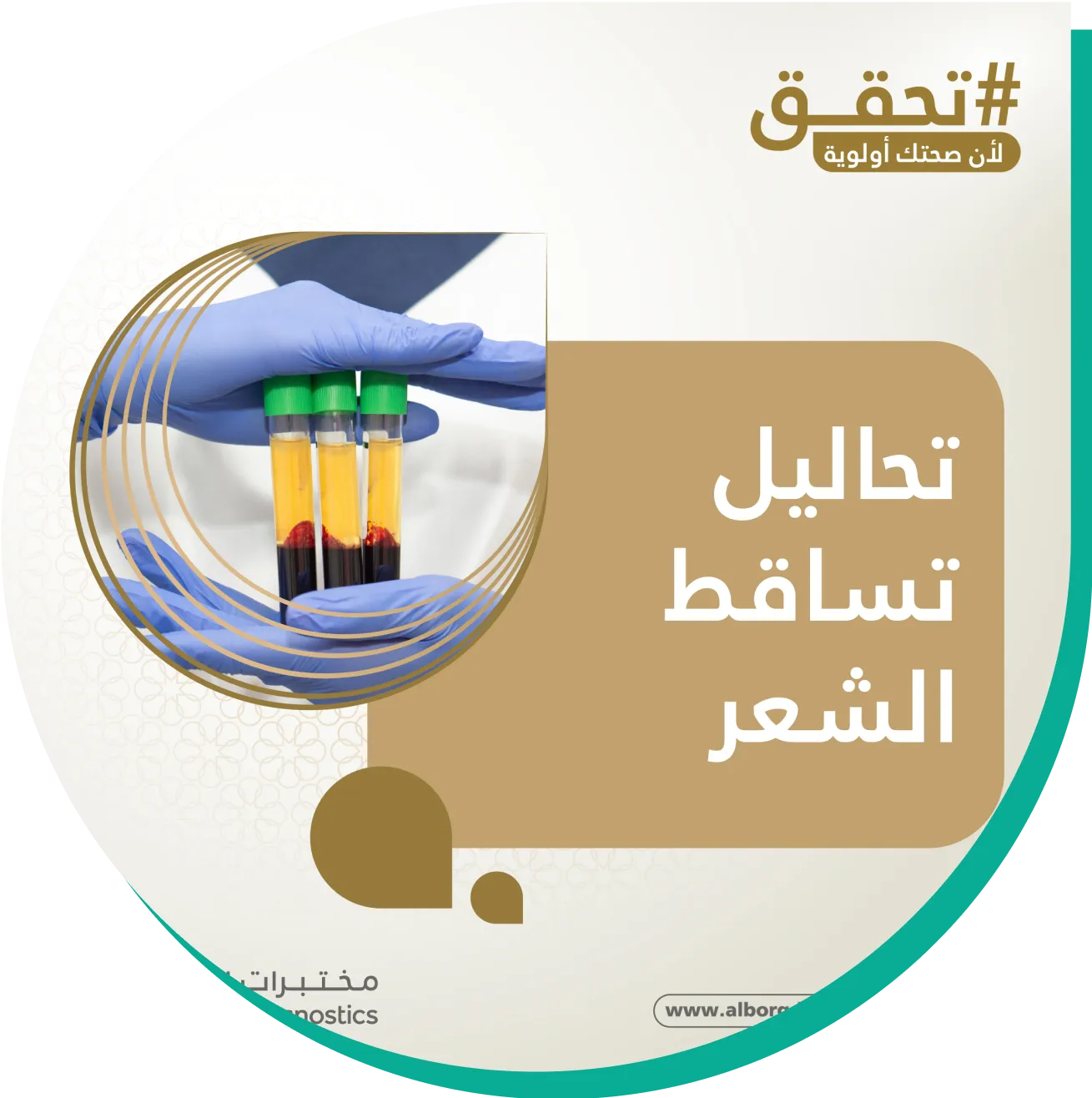
Al Borg Diagnostics
Tests for Diagnosing Hair Loss
We all lose a significant amount of hair daily, and it’s worth mentioning that losing 50–100 of hair per day is normal. However, hair loss can sometimes be excessive, indicating underlying medical conditions such as pattern baldness. In this article, you will find details about tests for hair loss: (1)
Tests for Diagnosing Hair Loss
When you visit a doctor for hair loss concerns, they will physically examine your scalp and inquire about your diet, hair care routine, and medical history. Afterward, they may request a series of tests and evaluations to diagnose the cause of your hair loss: (4)
Blood Tests
Blood tests can help detect medical conditions that contribute to hair loss. Your doctor may request the following blood tests for hair loss: (2)(3)
- Complete Blood Count (CBC): This test can detect various medical conditions or indicate the presence of an underlying illness. Blood cell levels can reveal infections or autoimmune reactions.
- C-reactive Protein Test (CRP): This test detects inflammation associated with alopecia, an autoimmune disease, and is ordered when there is suspicion of alopecia in the patient.
- Antinuclear Antibody (ANA) Test: This test is also used to detect alopecia, as the presence of this protein in the blood indicates the disease.
- Thyroid Tests: Hair loss can be associated with thyroid gland disorders, such as hypothyroidism or hyperthyroidism. Therefore, it is essential to perform thyroid hormone tests to determine if hair loss is related to thyroid hormone imbalances.
- Iron and Ferritin Tests: Studies have shown that hair loss is associated with low levels of iron in the blood, including low ferritin stores.
- Sex Hormone Tests: Research has revealed that the primary hormone responsible for genetic baldness is dihydrotestosterone (DHT). Elevated levels of DHT in the body can cause shrinkage of hair follicles and subsequent hair loss. Additionally, decreased levels of estrogen and progesterone are linked to hair loss in females.
- Prolactin Test: Elevated levels of prolactin hormone, also known as the milk hormone, can cause hair loss. This explains cases of postpartum hair loss.
Pull Test or Tug Test
The pull or tug test is one of the hair loss tests. It involves the doctor grasping small portions of hair, around 40 strands, from different areas of the scalp and gently tugging them. If six or more strands are pulled out, it indicates hair loss. (5)
Hair Card Test
This test is used to assess the health and growth of new hair. A dermatologist separates a strand of hair and approximates it into a small plastic card covered with bituminous material; its color starts to fade to reach the hair color, then reveals new hair growth and breakage. (5)
Scalp Biopsy
Scalp biopsy is the final hair loss test, involving taking a small sample of the scalp with a diameter of 4 millimeters, then examined under a microscope to help determine the cause of hair loss. (4)
After providing you with a list of hair loss tests, you can now visit any branch of Al-Borg Diagnostics to undergo these tests and learn more about them. Alternatively, you can choose from the tests available in the Hair & Beauty Package, where a qualified and trained staff will guide you to the tests that suit you.
Can hair loss be treated?
Several effective treatments are available for hair loss, which help to stop or at least slow down hair loss. It is worth mentioning that hair loss cases associated with underlying medical conditions require primarily treating the underlying disease to eliminate its effects on the hair.
However, hair transplant surgery is the ideal solution in cases of permanent hair loss, such as baldness. This procedure involves removing a patch of hair from the back of the head and transplanting it to the bald areas. (4)
References:
- https://www.nhs.uk/conditions/hair-loss/
- https://www.personalabs.com/blog/what-blood-tests-to-take-for-sudden-hair-loss-alopecia/
- https://www.trutestlab.com/blog/what-are-the-tests-to-be-done-to-diagnose-hair-loss
- https://www.mayoclinic.org/ar/diseases-conditions/hair-loss/diagnosis-treatment/drc-20372932
- https://nyulangone.org/conditions/hair-loss/diagnosis
- https://www.webmd.com/skin-problems-and-treatments/hair-loss/hair-loss-diagnosis-women
Check your health with
Hair & Beauty Package




